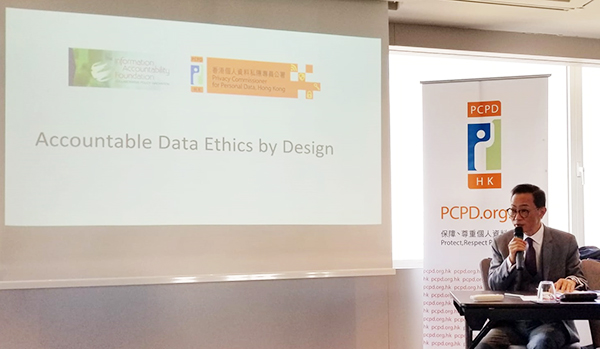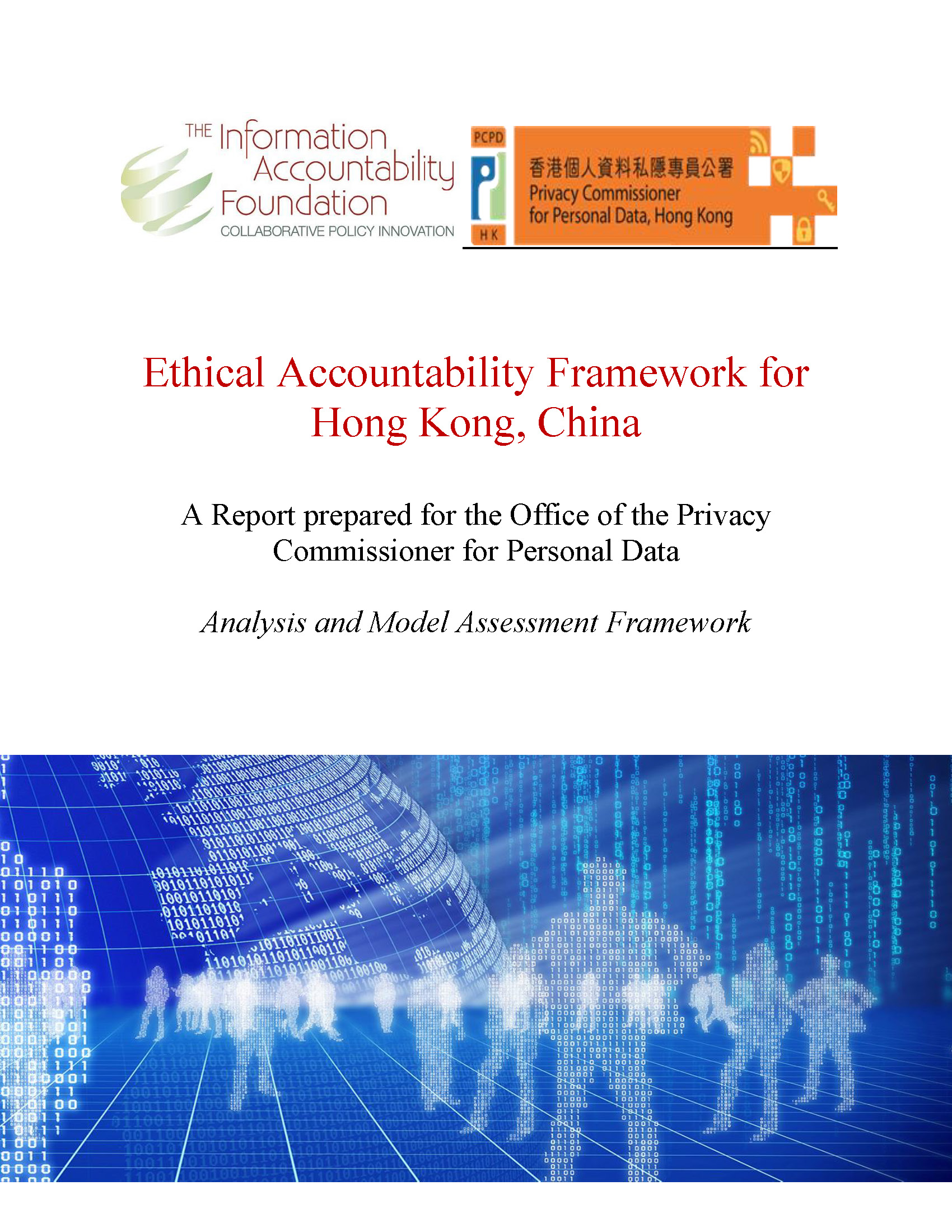Media Statements
Media Statement - Privacy Commissioner Released Research Report to AdvocateRespect, Beneficial and Fair Data Ethics Stewardship Management Value and Models
Date: 24 October 2018
Privacy Commissioner Released Research Report to Advocate
The Privacy Commissioner for Personal Data, Hong Kong (Privacy Commissioner), Mr. Stephen Kai-yi WONG, released the report of the research "Legitimacy of Data Processing Project", titled "Ethical Accountability Framework for Hong Kong, China", at the 40th International Conference of Data Protection and Privacy Commissioners (ICDPPC) yesterday (October 23) in Brussels, Belgium. Mr Wong gave a brief introduction on the research findings and their application to the business operations. The Privacy Commissioner also joined forces with other international data protection authorities to kick start promoting ethics and data protection in artificial intelligence.
The Privacy Commissioner commissioned a consultancy to conduct the said research study for the purpose of achieving ethical and fair processing of personal data and in advanced data processing activities (e.g. artificial intelligence and machine learning etc.) by fostering a culture of ethical data governance and addressing the personal-data privacy risks brought about by information and communications technology while balancing the interests of all stakeholders. Some twenty organisations in Hong Kong from various sectors, covering banking, insurance, telecommunications, healthcare services, transportation, etc., participated in the project by providing comments and feedback on the draft project deliverables, so as to ensure that the recommendations of the project were relevant and practicable in the business environment and day-to-day operations.
Mr Wong said, “Big data analytics, artificial intelligence and machine learning are increasingly being applied to various business levels to improve operational efficiency, but at the same time different privacy issues also arise from these applications. Organisations that amass and derive benefits from personal data should not ditch their mindset of conducting their operations to meet the minimum regulatory requirements only. They should also be held to a higher ethical standard that meets the stakeholders’ expectations by doing what they should do. Data ethics and stewardship can therefore bridge the gap between legal requirements and stakeholders’ expectations.”
He said it was an opportune time to publish the findings of this project at the 40th ICDPPC with a view to picking the wisdom of privacy professionals, business leaders, civil societies and other stakeholders from around the world in order to enhance the concept and practice of data ethics. “The theme of this year’s ICDPPC is ‘Debating Ethics: Respect and Dignity in Data-Driven Life’, which coincides with the findings of my office’s research by including data ethics into Data Stewardship Accountability Elements Graphic 1.”
Key findings of the research project are as follows:
Data Stewardship Accountability Elements
The project outlined the Ethical Data Stewardship Accountability Elements that call for organisations to:
Data Stewardship Values
Three Values are recommended for Hong Kong organisations when carrying out advanced data processing activities: respectful, beneficial and fair.
Assessment Models
In order to help implement the Data Stewardship Accountability Elements and the Values, two models are recommended.
The research report sets out the guiding questions of the above two assessment models to help organisations complete the assessment tasks.
Concluding in the event at the Conference, Mr Wong said, “The three data-stewardship values proposed in this research report are easy to understand, flexible, and realistic. The two model frameworks are also sensible, comprehensive, and practicable. I sincerely hope that these project deliverables will assist organisations in Hong Kong and beyond to implement data ethics in their daily operations, and to fully reap the benefits of the data-driven economy while protecting and respecting the fundamental rights (including the right to privacy), interests and freedoms of individuals.
“The project also signifies the strengthened efforts of my office in advocating a cultural change in personal data privacy protection. Through ongoing efforts in incentivising and engagement, I hope that in the not-too-distant future, ethical data stewardship will become a well-received norm in personal data protection among organisations in Hong Kong.”
Apart from releasing the findings of the above research project, during the ICDPPC, the Privacy Commissioner, together with 12 international data protection authorities, also proposed a declaration on ethics and data protection in artificial intelligence. Guiding principles and core values (including fairness, continued attention and vigilance, reduction of biases or discriminations, etc.) to preserve human rights in the development of artificial intelligence were set out, and a permanent working group was proposed to be established for addressing the challenges of artificial intelligence development.
The full text of the “Ethical Accountability Framework for Hong Kong, China” report is now available at www.PCPD.org.hk.
Download "Ethical Accountability Framework for Hong Kong, China"
Graphic 1 - Ethical Data Stewardship Accountability Framework

-End-

The Privacy Commissioner for Personal Data, Hong Kong Mr Stephen Kai-yi WONG releases the report of the research "Legitimacy of Data Processing Project", titled "Ethical Accountability Framework for Hong Kong, China", at the 40th International Conference of Data Protection and Privacy Commissioners.
Privacy Commissioner Released Research Report to Advocate
Respect, Beneficial and Fair Data Ethics Stewardship Management Value and Models
The Privacy Commissioner for Personal Data, Hong Kong (Privacy Commissioner), Mr. Stephen Kai-yi WONG, released the report of the research "Legitimacy of Data Processing Project", titled "Ethical Accountability Framework for Hong Kong, China", at the 40th International Conference of Data Protection and Privacy Commissioners (ICDPPC) yesterday (October 23) in Brussels, Belgium. Mr Wong gave a brief introduction on the research findings and their application to the business operations. The Privacy Commissioner also joined forces with other international data protection authorities to kick start promoting ethics and data protection in artificial intelligence.
The Privacy Commissioner commissioned a consultancy to conduct the said research study for the purpose of achieving ethical and fair processing of personal data and in advanced data processing activities (e.g. artificial intelligence and machine learning etc.) by fostering a culture of ethical data governance and addressing the personal-data privacy risks brought about by information and communications technology while balancing the interests of all stakeholders. Some twenty organisations in Hong Kong from various sectors, covering banking, insurance, telecommunications, healthcare services, transportation, etc., participated in the project by providing comments and feedback on the draft project deliverables, so as to ensure that the recommendations of the project were relevant and practicable in the business environment and day-to-day operations.
Mr Wong said, “Big data analytics, artificial intelligence and machine learning are increasingly being applied to various business levels to improve operational efficiency, but at the same time different privacy issues also arise from these applications. Organisations that amass and derive benefits from personal data should not ditch their mindset of conducting their operations to meet the minimum regulatory requirements only. They should also be held to a higher ethical standard that meets the stakeholders’ expectations by doing what they should do. Data ethics and stewardship can therefore bridge the gap between legal requirements and stakeholders’ expectations.”
He said it was an opportune time to publish the findings of this project at the 40th ICDPPC with a view to picking the wisdom of privacy professionals, business leaders, civil societies and other stakeholders from around the world in order to enhance the concept and practice of data ethics. “The theme of this year’s ICDPPC is ‘Debating Ethics: Respect and Dignity in Data-Driven Life’, which coincides with the findings of my office’s research by including data ethics into Data Stewardship Accountability Elements Graphic 1.”
Key findings of the research project are as follows:
Data Stewardship Accountability Elements
The project outlined the Ethical Data Stewardship Accountability Elements that call for organisations to:
- Define data stewardship values, develop them into guiding principles and then translate them into organisational policies and processes for ethical data processing.
- Use an “ethics by design” process to translate their data stewardship values into their data analytics and data use design processes so that society, groups of individuals, or individuals themselves, and not just the organisation, gain value from the data processing activities.
- Require Ethical Data Impact Assessments (EDIAs) when advanced data analytics may be impactful on people in a significant manner and/or when data-enabled decisions are being made solely by machines automatically.
- Use an internal review process that assesses whether Data Stewardship Accountability Elements and EDIAs have been properly conducted.
- Be transparent about processes; ensure thorough communications on managing the advanced data processing activities and the rationale behind the decisions; address and document all societal and individual concerns and design individual accountability systems that provide appropriate opportunities for feedback, relevant explanations and appeal options for impacted individuals.
- Stand ready to demonstrate the soundness of internal processes to the regulatory agencies when data processing is or may be impactful on people in a significant manner.
Data Stewardship Values
Three Values are recommended for Hong Kong organisations when carrying out advanced data processing activities: respectful, beneficial and fair.
|
Respectful |
|
| Beneficial |
|
|
Fair |
|
Assessment Models
In order to help implement the Data Stewardship Accountability Elements and the Values, two models are recommended.
-
Model Ethical Data Impact Assessment:
It is adopted for assessing the impact to all stakeholders’ interests on the data collection, use and disclosure in data-driven activities.
-
Process Oversight Model:
It looks at how an organisation translates organisational ethical values into principles and policies and into an “ethics by design” programme. It also considers how the internal review processes, such as conducting EDIAs and establishing effective individual accountability systems, are implemented.
The research report sets out the guiding questions of the above two assessment models to help organisations complete the assessment tasks.
Concluding in the event at the Conference, Mr Wong said, “The three data-stewardship values proposed in this research report are easy to understand, flexible, and realistic. The two model frameworks are also sensible, comprehensive, and practicable. I sincerely hope that these project deliverables will assist organisations in Hong Kong and beyond to implement data ethics in their daily operations, and to fully reap the benefits of the data-driven economy while protecting and respecting the fundamental rights (including the right to privacy), interests and freedoms of individuals.
“The project also signifies the strengthened efforts of my office in advocating a cultural change in personal data privacy protection. Through ongoing efforts in incentivising and engagement, I hope that in the not-too-distant future, ethical data stewardship will become a well-received norm in personal data protection among organisations in Hong Kong.”
Apart from releasing the findings of the above research project, during the ICDPPC, the Privacy Commissioner, together with 12 international data protection authorities, also proposed a declaration on ethics and data protection in artificial intelligence. Guiding principles and core values (including fairness, continued attention and vigilance, reduction of biases or discriminations, etc.) to preserve human rights in the development of artificial intelligence were set out, and a permanent working group was proposed to be established for addressing the challenges of artificial intelligence development.
The full text of the “Ethical Accountability Framework for Hong Kong, China” report is now available at www.PCPD.org.hk.
Download "Ethical Accountability Framework for Hong Kong, China"
Download "Data Stewardship Accountability, Data Impact Assessments and Oversight Models"
Download the opening remarks delivered by the Privacy Commissioner for Personal Data, Hong Kong Mr Stephen Kai-yi WONG at the side event "Ethics by Design: Building A Framework for Ethical Assessments and Data Stewardship" co-hosted by Information Accountability Foundation and PCPDGraphic 1 - Ethical Data Stewardship Accountability Framework
-End-

The Privacy Commissioner for Personal Data, Hong Kong Mr Stephen Kai-yi WONG releases the report of the research "Legitimacy of Data Processing Project", titled "Ethical Accountability Framework for Hong Kong, China", at the 40th International Conference of Data Protection and Privacy Commissioners.
 |
|